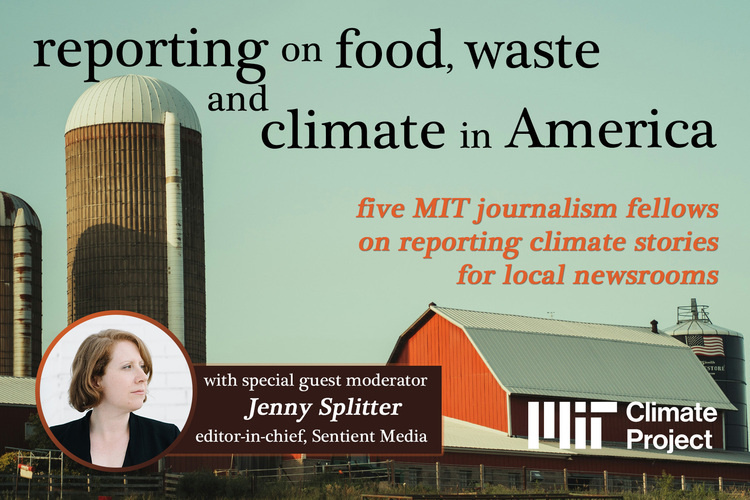
Events
Reporting on Food, Waste and Climate in America

Each year, MIT supports five journalists around the country in developing deeply-reported stories about climate change and its solutions, for the news outlets Americans trust the most: the local and regional newsrooms where reporters write about their own communities. This spring, these MIT Environmental Solutions Journalism Fellows focused on the under-covered climate challenges of the food, agriculture and waste sector—which accounts for over 10% of America's climate pollution and the majority of our powerful, fast-warming methane.
Join MIT's newest class of Fellows as they discuss their work covering food, waste and climate in Pennsylvania, Michigan, Texas, Maryland and Illinois. Special guest moderator Jenny Splitter, editor-in-chief of Sentient Media, will lead a conversation with our fellows on the diverse audiences they engaged, the challenges and opportunities of climate reporting in local outlets, and how they connected their stories to local values and priorities—for their readers, and for the farmers, waste managers and city and state officials with the greatest capacity to effect change.
About the panelists
Karina Atkins is a Chicago-based environmental journalist covering how climate change is affecting the Midwest. Her fellowship project for the Chicago Tribune explores overlooked threats to Illinois’ farmland and groundwater that, if left unaddressed, could prove catastrophic for national food security in the face of climate change, while showing how, with proper regulations and investment, Illinois still has time to become a hub for climate-smart agriculture.
Carolyn Beans is a science reporter covering food, agriculture, and health from her home base in Lancaster, Pennsylvania. Her food writing has appeared in Undark, The Atlantic, PNAS Front Matter, Slate, The Washington Post, TED-Ed, The Food and Environment Reporting Network and other outlets. Her project reports on Pennsylvania dairy farmers’ efforts to measure and minimize greenhouse gas emissions, and ultimately earn a return on climate-smart milk.
Elena Bruess covers the environment and climate for the Houston Landing. She has covered water, climate, environment and health issues throughout the Midwest and Texas, including as a Pulitzer Center reporting fellow. Her fellowship project explores landfill pollution, methane emissions, remediation and the historic and disproportionate impact landfills and trash incinerators have had on marginalized communities in Houston.
Nina Ignaczak is an award-winning journalist and editor based in Detroit, and the founder of Planet Detroit, a digital media startup producing public interest journalism on climate, equity, health, and the environment, centering grassroots voices and solutions. Her project project investigates how food waste and methane emissions in Metro Detroit contribute to Michigan’s climate challenges, and explores community-driven solutions to reduce emissions and build climate resilience.
Paul Ruffins was one of the first journalists to cover the complexities of environmentalism in Black communities and served as a delegate to the first People of Color Environmental Justice Summit. Since then, he has been the managing editor for several community newspapers and social justice organizations. His project investigates a pioneering experiment in food composting in Prince George’s County in the suburbs of Washington, D.C., illuminating how it works, whether it is delivering as promised, and how successes can be replicated regionally and nationally.
Jenny Splitter (moderator) is the Editor-in-Chief of Sentient, the only nonprofit, nonpartisan newsroom dedicated to reporting on factory farms, and an award-winning food and climate journalist. Her work has been published in The Washington Post, The Guardian, Popular Mechanics, New York Magazine, Vox and others.
About the MIT Climate Project
The MIT Climate Project is a new, whole-of-MIT initiative to respond to the multiple challenges of global climate change. Through this project MIT seeks to become, within a decade, one of the world’s most prolific and collaborative sources of technological, behavioral, and policy solutions—solutions that will change the expected trajectory of global climate outcomes for the better. Learn more
Among the programs housed at the MIT Climate Project is the MIT Environmental Solutions Journalism Fellowship, which since 2021 has supported freelance or staff journalists associated with U.S. local and regional newsrooms in developing high-impact news projects that connect local perspectives, values and priorities with climate change science and solutions. By engaging Americans who are unsure, disengaged, or doubtful about the need to act on climate change, these reporting projects advance the frontiers of public opinion on climate as both the impacts and the solutions to climate change grow more visible in Americans’ daily lives. Learn more

